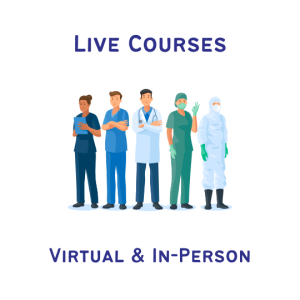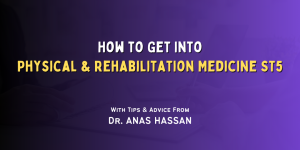
Published September 4, 2025 | Updated September 4, 2025
By MedCourse
Useful, relevant, and interesting content for UK Junior Doctors.
About the Author

Dr Millie Wood, ACCS Emergency Medicine ST1, Peninsula
I chose to take 5 years post graduation prior to applying for specialty training to gain as much EM experience as possible. From FY2 I knew Emergency Medicine was for me. I completed an 8 month rotation in it due to Covid-19, then continued to locus in the same trust whilst lock down continued.
As was always the plan, I then relocated to Perth, Western Australia where I spent a year working as an ED SHO before stepping up as a Junior Registrar.
With a very keen interest in Pre-hospital medicine I was fortunate enough to obtain a senior clinical PHEM fellow role at the Royal Cornwall Hospital for 12months and it was during this post I did my ACCS application.
The 3.5years of working purely in EM, in both secondary and tertiary hospitals, not only showed me how excited I was by this specialty but allowed me to realise I had the insight and resilience required to enter what I knew by then was not an “easy” career.With all of this under my belt I was fortunate to do well in my ranking and get my first choice job where I am now 4months into ACCS EM training and loving it.
Courses & Conferences to Attend
There are ample courses and opportunities available now for those either wanting to find out more about an EM career or those wanting to gain knowledge and confidence in undertaking skills and procedures specific to EM.
Each course has its costs, as well as transport and accommodation to factor in, but if you are able to seek out those in your area or have friends and family nearby to stay with, I would wholeheartedly recommend this. Your study budget should assist in covering some costs, too.
Most of the courses and conferences I have attended over the last few years relate to pre-hospital medicine, both in Australia and in the UK. From these, I have made connections that have led to further opportunities- one of the best things about attending events in person.
During my fellowship year, I gained certification in “Pre-Hospital Trauma Life Support”, “Adult Trauma Life Support” and “Advanced Paediatric Life Support” and became an ALS instructor.
Having advanced life support courses prior to going into training will not only help you in your clinical practice, but when it comes to your application, will prove your commitment to training and education, making you stand out amongst your peers.
There are EM radiology and ultrasound courses available, which will again aid your application, but are also beneficial to your practice of which I did whilst in Australia.
Attending courses and conferences that you are genuinely interested in will come across in your interview when you talk about them, versus those attended for a tick box, so chat to colleagues in training and suss out options available before booking.
How to Maximise Your Portfolio for Application
Experience and commitment! ACCS, EM has become extremely competitive and as a result these two things are proving increasingly important to give you the best possible chance of getting into training.
Emergency Medicine is not a choice you make for a straightforward lifestyle!
Before committing, you need to not only prove to yourself but also to those interviewing you that you absolutely know it is the speciality for you.
More recently, successful applicants are those who have taken years out post foundation, prior to applying, to gain experience both in a clinical setting but also in general life. Being a good EM clinician requires you to cope with pressure, constantly make decisions, communicate well with, and lead multiple team members, whilst remaining positive and approachable.
Showing that you have a life outside of medicine is almost just as important as clinical experience when it comes to applying to EM. You not only gain skills to use in a clinical setting, but you also prove that you are human and recognise the importance of family, friends and hobbies as a vital crutch to your future career in EM.
For myself, I can’t sit still, which turns out to be a common trait for EM applicants! This is not a bad trait at all, and I found it easy to link some of the questions to non-clinical scenarios, which received good feedback post interview. The increase staff burn out rate in EM and ways to deal with this are important to acknowledge. Proving that you have the ability to relax in whatever way this may be, (often not how most people “relax”!), is just as important, and I was able to draw on this in my interview to good effect.
If you are fortunate to have had a reasonable amount of experience working in ED, coupled with a life outside of work, then your enthusiasm for it will naturally shine through, and it will make for an enjoyable interview.
The other part of the application is the MSRA. As irrelevant as lots of the questions may feel for an EM job, you see more and more primary care cases presenting to ED now, so refreshing your knowledge by doing this exam is quite helpful. I purely used PassMed, working through all the question bank, including the SJT questions. There are courses and books available, but I found the questions and reading relevant guidelines ample to obtain a good mark.
During your foundation years, you will have to complete a QI project. Most likely, it wasn’t related to emergency medicine.
Most Emergency Departments will have a QI/ audit lead consultant. If you can contact them and try to assist with a relevant project that may also be able to be produced and presented as a poster locally or nationally, there are multiple opportunities.
In terms of teaching contact the consultant lead for medical students. Offering to have students shadow is something most will say in an interview. If you are able to provide formal teaching or join the OSCE examination committee, this is easy to do and a beneficial learning experience for you also.
Making the Most of Emergency Medicine Placements
You will find, due to the availability of locum shifts, that a lot of people work in ED, so trying to stand out from others is important in this competitive world.
If your only experience working in ED is a 4-month rotation in F2, then try to maximise this as best as possible. Asking to be the Resus doctor for the day early on in the job will allow you to gain exposure to unwell patients whilst being well supported. Over the 4-month period, you should have become more independent with managing certain resus patients and can offer to lead, with consultant supervision, to get a chance to manage a team, giving you lots to draw upon in your interview. Seeking out any QI/audits whilst you are working in ED and being actively involved in any simulation and teaching opportunities will stand you in good stead.
Since COVID, minor injuries are streamed to separate urgent treatment centres or minor injury units. Seeking out opportunities to go and do a shift there, on a day off or study day, will allow you to develop skills that are needed in a night shift when these patients come to ED. This will also prove to those interviewing you that you understand the dynamics of ED and how important it is to develop and maintain your skillset.
If there is an opportunity to undertake an ED fellow, then take it! Fellow roles are often 80% clinical time in ED and the other 20% having extended opportunities such as ultrasound, simulation, trauma and teaching. These show not only that you are committed to ED but also recognise the importance of developing the other skills and experiences required to aid your ED training.
During my fellow year, I got a non-trainee RCEM portfolio and was able to start to get certain procedures and cases signed off. This proves that you are genuinely committed, as it is an expense to do this. It will also give you a good understanding of the trainee requirements and the curriculum firsthand if this comes up in your interview.
As well as this, you can start to attack some of the exams, which will give you a real advantage once it comes to starting ACCS. The MRCEM primary exam runs twice a year, and you need to have completed this exam, the MRCEM SBA and OSCE by the end of ST 3 for ACCS ED.
Over the last few years, ED has become increasingly overcrowded, and in terms of your application and interview, it is important to recognise this. There are some important documents to be aware of and have read, namely RCEM’s “Tackling Emergency Department Crowding”. This will allow you to add evidence-based facts and figures to your own views on how you see EM in the future.













